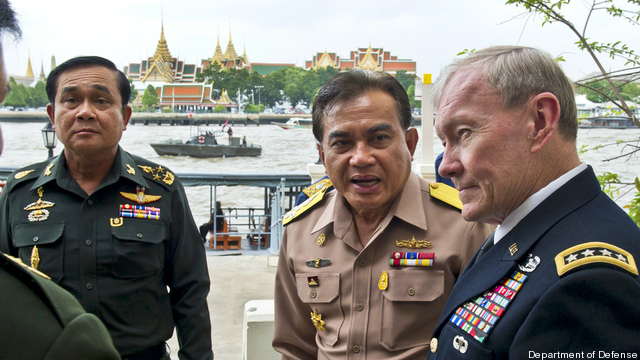Personal Military Ties Key To Successful Alliances: CJCS Demspey
Posted on

WASHINGTON: Just back from his trip to Asia, the jet-lagged Chairman of the Joint Chiefs of Staff attended graduation ceremonies at the Pentagon’s National Defense University, where he singled out NDU’s first-ever Vietnamese graduate, a colonel in the People’s Army of Vietnam, as an example of the kind of relationship-building the US military must do around the world and especially in the Pacific.
“Practicing the science of human relationships,” said Gen. Martin Dempsey, “is crucial to the survival of civilization.”
In his prepared remarks (click here for video), Dempsey held up last year’s intervention in Libya by a coalition of 18 nations as “an object lesson in the value of military-to-military relationships”: “There were certainly some bumps in the road,” he said, “but there’s no way an operation of that magnitude could have been planned and executed that quickly – and just to be clear, we’re talking about hours and days, not weeks and months – without military relationships based on trust.“
“As senior leaders,” he told the NDU graduates — drawn from the US military, civilian agencies, and abroad — “you will find it increasingly important to practice the science of human relationships. As you become involved in making strategy, you will need to nurture relationships to make that strategy work.” The US military has spent decades working with foreign countries, from exchanging liaison officers and advisors to conducting international exercises to fighting side-by-side in war zones from Korea to Afghanistan, but, said Dempsey, “my trip to the Asia-Pacific showed me we have to do even more.”
On a more mundane level, relationship-building is central to the administration’s strategic guidance released in January. The new strategy scales down America’s massive military presence overseas — not only in the war zones of Afghanistan and Iraq, but also in Europe — in favor of what it calls “innovative, low-cost, and small-footprint approaches to achieve our security objectives, relying on exercises, rotational presence, and advisory capabilities.” Dempsey has previously emphasized the Defense Department’s human capital, not high-cost hardware, as what will get it through an era of tight budgets. And while the chairman oversees all four military services, it’s his own service, the Army, which has most enthusiastically embraced the building-partners mission both in its budget and in a recent strategic workshop at the Army War College.
Subscribe to our newsletter
Promotions, new products and sales. Directly to your inbox.
